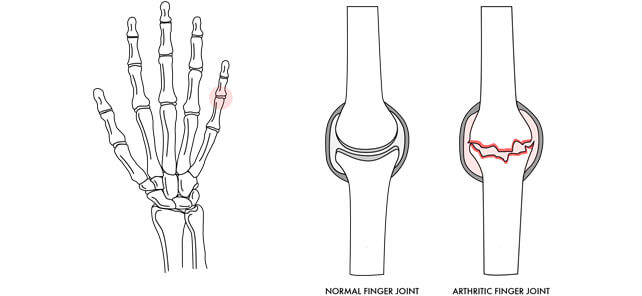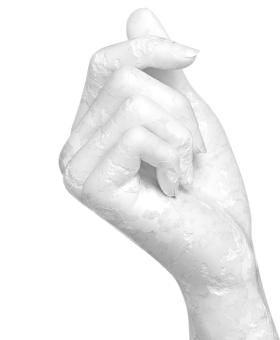Overview
The joints in your hands and fingers are where two bones come together and glide as movements occur. Each bone has a joint surface made of cartilage that allows these joints to glide smoothly without pain or discomfort.
Arthritis is a condition causing the joint surface to become damaged, inflamed and painful. This can result in bone rubbing on bone, not only causing the cartilage to become damaged but the bone also.
Osteoarthritis is the normal wear and tear of joints over time, but this can also be exacerbated by trauma to the joint or hand. Rheumatoid arthritis is an autoimmune disease, causing destruction of the joint and inflammation of the surrounding structures. The conditions and treatments for each of these is very different.
Symptoms
Osteoarthritis symptoms include:
- Pain – on movement or at rest
- Joint swelling or stiffness (worse in the mornings)
- Joint deformity
- Loss of joint function resulting in difficulties with activities of daily living
Rheumatoid arthritis symptoms include:
- Joints can be tender, warm and swollen
- Typically the proximal interphalangeal (PIP) and the metacarpophalangeal joints are the most affected in the hand
- Hand deformity can be profound.
- The main treatment for RA is medical and modern medications have prevented some of the serious deformity seen in the past.

Treatment
Arthritis is a lifelong treatment and management program between the Patient, the Surgeon and the Hand Therapist. The ultimate goal is to minimise pain and promote maximal independence in daily tasks. This can be done via:
- Splinting and Patient education
- Surgery – the two main procedures are Arthroplasty (joint replacement) and Arthrodesis (joint fusion)
Dr Mackay will work closely with the Patient and the Hand Therapists to achieve the best results possible to reduce pain and promote function of the hand.
Pharmaceutical medication is sometimes useful but should be used under the supervision of your GP. Some medications are safe to take long term but most are not recommended for more than a few days at a time.
Non-pharmaceutical treatments such as fish oil, turmeric, chondroitin or glucosamine are a saviour to some patients but ineffective for others. At the very least they are worth a try to see if they work for you.
